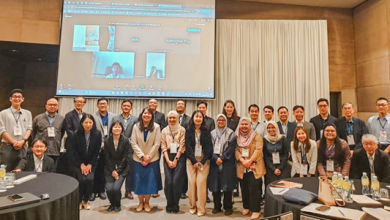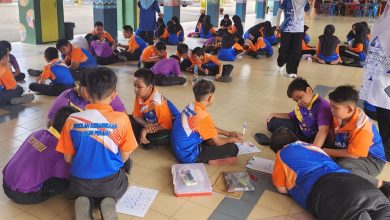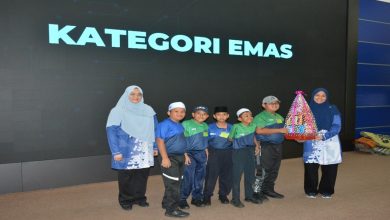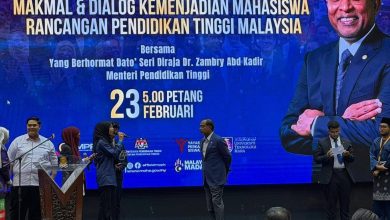UUM champions sutainability and social responsibility through AIMS Programme at Zoo Negara
Photos Muhammad Iqbal Roslan
SELANGOR, 12 November 2025: Universiti Utara Malaysia (UUM), through its Centre for International Affairs and Cooperation (CIAC), reaffirmed its dedication to sustainability and community engagement by spearheading a University Social Responsibility (USR) initiative at Zoo Negara Malaysia.
The activity was part of the 19th Annual Review Meeting of the Asian International Mobility for Students (AIMS), organised by the Bahagian Pengantarabangsaan Pendidikan Tinggi, Department of Higher Education (JPT), Ministry of Higher Education (MOHE), from 4 to 6 November 2025 in Putrajaya.
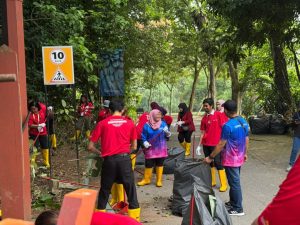
Gathering more than 230 participants, including international relations officers, mobility coordinators, and institutional representatives from AIMS member countries such as Indonesia, Thailand, the Philippines, Brunei, Vietnam, Cambodia, Singapore, South Korea, and Japan — the event served as a platform to review AIMS’ achievements and strengthen regional collaboration in higher education.
As part of the AIMS social outreach component, three University Social Responsibility (USR) projects were undertaken by Malaysian AIMS member universities, Universiti Kebangsaan Malaysia (UKM) – River Cleaning Project; Universiti Sains Malaysia (USM) – ASEAN Corner @ Library and Universiti Utara Malaysia (UUM) – Zoo Grooming Project at Zoo Negara.
Each project embodied the shared spirit of collaboration, sustainability, and social contribution, reflecting the collective determination of AIMS members to give back to society through meaningful engagement.
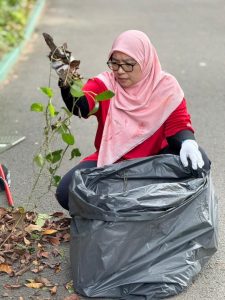
Representing UUM, 27 participants — comprising international officers, mobility delegates, and volunteers — took part in the half-day Zoo Grooming Project. The initiative focused on environmental clean-up, landscape restoration, and conservation awareness activities. Participants worked hand in hand with Zoo Negara staff, cleaning walkways, trimming plants, and learning about the animal care and habitat management.
The initiative aimed to nurture environmental stewardship, teamwork, and volunteerism while cultivating a deeper sense of social responsibility among participants from across Asia. Many described the experience as both transformative and humbling, reinforcing the imporance of small actions that contribute to lasting change.
Ms. Warunee Kaewbunruang from Mae Fah Luang University, Thailand, expressed her appreciation to UUM for leading the initiative: “It was a meaningful day of giving back to nature and the community. We were reminded of the importance of teamwork, care for the environment, and how small steps can lead to big changes.”
Assoc. Prof. Dr. Takayoshi Maki from Hiroshima University, Japan, described the programme as transformative: “Through the Zoo Groom Project, I became a better person. Self-improvement leads to a better society. I am truly grateful for this valuable opportunity and the care shown by the organisers.”
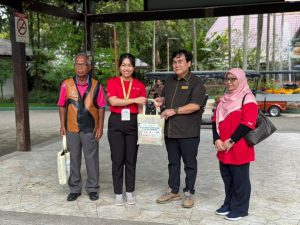
Beyond its environmental outcomes, the project strengthened ties among AIMS member institutions and deepened praticipants’ appreciation for collaborative action. Participants also enjoyed a guided tour of the zoo, describing it as a “living classroom” that enriched their understanding of wildlife conservation, sustainability, and experiential learning.
By contributing to Zoo Negara’s upkeep, the initiative directly supported the Sustainable Development Goals (SDGs), particularly SDG 13: Climate Action, SDG 15: Life on Land and SDG 17: Partnerships for the Goals
The programme concluded with a certificate presentation ceremony, followed by a token of appreciation presented to the President of Zoo Negara in recognition of the zoo’s cooperation and support.
Through this initiative, UUM not only advanced its commitment to the environmentalsustainability but also strengthen its role in cultivating socially responsible, globally minded citizens. The Zoo Grooming project stands as a testament to UUM’s enduring belief that education extends beyond classrooms — into the heart of communities and the world we share. – Assoc. Prof. Ts. Dr. Norliza Katuk


